- Home
- Robert E. Howard
The Pirate Story Megapack: 25 Classic and Modern Tales Page 4
The Pirate Story Megapack: 25 Classic and Modern Tales Read online
Page 4
“You needn’t have been,” retorted the spinster. “Though I appreciate your idea. Any signs of foul play?”
Jim nodded. The girl had hung up and was coming back. But how did Lynda Warner come to suspect that there should have been murder committed?
“They’ll be over by eight o’clock,” the girl announced, excitement glowing in her face. “You’ll stay for supper, Mr. Lyman. We—we can’t lose sight of you.”
“But—” Jim wanted to spruce up a little. Here was an atmosphere of refinement, of elegance to which he was not accustomed. He felt suddenly self-conscious, unkempt. “I should get that diary,” he suggested.
“That will keep for a little while. I have a thousand questions to ask you, lots to tell you. Will you wait for a few minutes here, alone? Lynda, will you come with me?” She vanished.
Her cousin, lingering at the door, said softly, “I will tell her.”
Meaning the skeleton, Jim told himself. His head buzzed a bit. Here were adventure and opportunity hand in hand, bowing to him, like a pair of friendly djinns. Things had happened too swiftly for him to properly adjust them. He was like a player given a hand by a swift dealer. He had picked up the cards, glanced at them, but he had yet to arrange them in sequence, separate them into suits, appraise their true value. At first glance he saw he had some heart cards, but he was doubtful about them. Jim had not considered himself the type to fall headlong into love. On the other hand, he had never met a girl like this before. Jim was well enough born and bred. But he had a fair education and had taken postgraduate work in the greatest of all universities—the world at large. Long ago, in the little village of Maine, he had seen and known such things as surrounded Katherine—the diminutive of that would be Kitty, he supposed, if a chap ever got familiar enough with her to use it—and her cousin. There had been antiques and old silver and fine linen with all the niceties that go with them in his mother’s house. But of late years those things had gone by the board. He had roughened and toughened. He had lost his finer manners, perhaps his sensibilities.
He looked at his suit of serge. It had been cheap, because he could not afford any more than he paid. Cheap clothes in this day and time are shoddy and it had worn quickly and badly. It looked like a suit from the slop chest. The same way with his shoes, his tie, his hat, everything. A chap like he was would constantly offend the girl’s ideas of life, he imagined. Then took himself to task for a fool for thinking about such things.
The chance to go away in a ship of his own—she had hinted he would be master—down to the South Seas, with her! She crept in again to the foreground of his dreams, tugged at him with a hundred warps of interest. To find a missing man and a missing treasure, here was romance, or folly, and Jim was not old or world-worn enough to entertain the suggestion that the two are twins.
It was Lynda Warner who reappeared and escorted him up a white, thin-spindled, mahogany-railed stairway, curving to the next floor. He found himself in a guest room with furnishings of white, and hangings of gay chintz, rag rugs on the floor, a door half open to a tiled bathroom. It was as different from the room he had at the National House, uptown, as the forecastle of a ship is to the cabins aft. Jim was used to the latter, but this increased his ill ease till he caught sight of himself in the glass and laughed at his reflection for that of an egregious ass.
“It isn’t the clothes, you chump,” he told himself; “it’s the man. You’re straight enough and decent enough under your artificial hide. You can always buy duds. You can always mend your manners. As for the girl, you’ve got to do your best to persuade her, or her cousin, that she’ll be throwing her money away. Without butting in too personally, of course. If you can’t, or if you get in too deep, it’s up to you to drift off and fade away. She’s a yacht built for speed in summer waters and summer winds; you’re a trading schooner and out of her class. You belong moored to a copra wharf, not off a yacht club float.”
The heart-to-heart talk did him good, and after he had washed up and brushed his hair and clothes, be went downstairs cheerfully with recovered poise. He appreciated the courtesy that left all talk of the vital question out of the meal, covering it so successfully that it appeared dismissed. And he appreciated the meal: crisp waffles with honey, fresh asparagus with poached eggs and a sublime sauce over all, a huckleberry pie that melted, crust and all, in one’s mouth, and coffee such as he had not tasted for ten years. Lynda Warner exhibited a rare fund of anecdote and a sense of humor that the girl reflected and Jim enjoyed. The supper was savored with the best of condiments—laughter.
Only the porches and the two front rooms of the house had been given over to business, it seemed, though there were some goods stored in the barn back of the little garden. The rest of the house was private and the property of the girl’s father—or the girl herself, Jim feared. The dining room held portraits of Avery Churchill Whiting, the missing skipper, a ruddy-faced mariner with gray hair and a blend of kindliness and determination in his strong features; and of James Avery Whiting, father of the aforesaid, also a captain, but in naval uniform. His sword hung below the frame.
There was a serving maid, angular almost as Lynda Warner, privileged by custom and her own indomitable determination to know all about everything that was going on. The elimination of all reference to the Golden Dolphin might partly have been staged for her benefit, Jim surmised. She was patently devoured with anxiety to know who he was, and how he came to be invited. She surveyed him between service with a puzzled face, her head cocked to one side like an undetermined hen.
They remained in the dining room, which appeared to be also used as a general living room, and the maid dawdled over clearing away. But she was gone at last and both women insisted upon Lyman smoking, producing cigars that were both good and properly moist. Gratefully enjoying it, he listened in his turn.
Avery Churchill Whiting had, it seemed, retired from the sea, inland to Foxfield where relatives had settled for land commerce. He had married late and was forty when Katherine Whiting was born—the only child. Her mother died soon after and the two became chums, the girl going on voyages until Captain Avery decided he was fairly well fixed, that the merchant marine was rapidly going to the dogs, and that he hated steam worse than ever. Therefore he settled to enjoy his three delights; his daughter, trotting horses, and flowers.
His wife’s brother, Stephen Foster, native of Foxfield, was the uncle who was coming at eight o’clock, with his son, Newton. He was a manufacturer of blankets and woolen goods and Jim gathered that he had made almost a million during the war. Gathered also from a hint of Lynda Warner that he was not averse at anytime to making more; that, born on a farm, gaining footing in the office of a mill after factory experience, he had finally made good as producer in a small way until the war gave him his great opportunity. Now, having tasted power, he was obsessed with the desire of great wealth and what it might do to make him a ruler of men.
The son, it seemed, was a more negligible quantity, confining most of his activities to various amusements, a Yale graduate. Lynda Warner, with an inimitable trick of suggestion, drew these sketches, which Jim felt were excellent portraits, in a few words. It appeared that she was not over friendly to the Fosters, father and son, and Jim noticed that the girl entered no especial protest, save to disregard her caustic interjections.
The important factor was that the Fosters owned a third share in the Golden Dolphin and its hidden treasure. Lyman was glad that a man—and a successful business one—with a real interest in the affair, was to take part in the council. The talk of hidden treasure was attractive enough, but if it was of bulk small enough to be concealed on the ship it did not seem likely that it would have been left there. There was that skeleton! He wondered whether Lynda Warner had already told the girl about it. It would have to be mentioned at the conference.
“My father,” said the girl, “once got to be very friendly with a chief named Mafulu, ruler of an island somewhere near the Bismarck Archipelago. That is,
he had been ruler until the Germans took his island away from him and made plantation slaves out of all his people. After that he hated all white men. He even mistrusted father for a long while after dad had saved his life. But they got to be blood brothers and called each other by the other’s name. Mafulu was Vaitini—the nearest his tongue could come to Whiting—and father was Mafulu. They had not seen each other for years and father had quitted the sea.
“Mafulu, and some of his islanders, were employed as pilot and crew by a man, an eccentric millionaire who had taken up anthropology, with the tracing of the drift of the Malayo-Polynesian races as his especial hobby. As father understood it, Mafulu had graduated from pilot and come to be his right hand man. At all events, he accompanied this millionaire through the archipelagoes, to Tahiti, to Hawaii and at last to San Francisco. He was still on the ship, or yacht, when the owner dropped dead of heart disease. There was some squabble among the heirs, and Mafulu was dismissed. He had been too proud to accept actual wages, so he was practically penniless, unable to speak much of the language, bewildered by the bustle of a city, robbed, and cheated. Finally the fogs of San Francisco proved too much for him. He was a magnificent specimen of manhood, father said, and probably would have lived to be almost a hundred in his native haunts. As it was, he was found in a dying condition in a miserable sailors’ lodging house where he had been the drudge—that fearless chief and warrior—for enough to eat and a hole to crawl to at night. It was consumption of the most rapid sort. Some reporter got part of his yarn and pieced together more, enough to make a feature story. It was copied by the Associated Press, more briefly.
“Father left for San Francisco within six hours after he had read the item in the local paper. That was like dad. Mafulu was a man, he said, and there were few men nowadays. He respected the obligations of his blood brotherhood. And Mafulu literally died in father’s arms, died still hating all white men—was it any wonder?—save one, the one he called by his own name and who called him Vaitini.
“Father had the body cremated, much in the custom of Mafulu’s tribe, and he promised Mafulu to take back his ashes and have them properly buried on his own island. And Mafulu told father of the existence of a double atoll rich with virgin oyster shell, drawn on by Mafulu’s ancestors for the pearls they used for trading. Its whereabouts were known only to the ruling chief and his son. Mafulu had no son. After the Germans annexed his land his people went no more to the atoll. He gave father the chart he had always carried and explained it to him. The hospital people had thought it was a charm and nobody had ever thought it worth while to steal it. Mafulu had kept it on a sinnet string about his neck. Father translated its directions into more modern shape and he gave the chart to me when he sailed. Here it is. Mafulu swore—and father knew him to be absolutely truthful under his oath of blood—that there were pearls there of such value that dad calculated there must be a dozen fortunes in the two lagoons.”
Lyman took the chart and surveyed it with enthralled interest. It did not look much like a map. It consisted of slender reed sections bound flat, mat fashion, with strands of fiber woven into them in crosswise curves and lines. Here and there a small shell was attached. The whole thing barely covered the palm of his hand. No one would have guessed it to be the key to fortune.
“The fibers,” said the girl, “represent currents and sailing courses; the shells are islands. The trip has to be taken at a certain time of the year when certain winds prevail and certain constellations are above the horizon.
“On the strength of it my father persuaded my uncle, Mr. Foster, who was just beginning to make money then, to go shares in the expedition. They needed a ship and ships were scarce at that time, three years ago, when the war used every available bottom. They wouldn’t take father for the war because of his age but he was in wonderful health and strength, really in his prime. They got a small shipbuilder father knew in Maine to build the Golden Dolphin, Mr. Foster thought a ship a good investment aside from the treasure hunt, and he believed in that. His son was at Camp Devens.”
“Until the armistice,” put in Lynda Warner.
“So the ship was built and launched. I christened it. I saw it built from the laying of the keel. Father almost lived at the yard. All his love of the sea returned. I begged for him to take me but he said the trip was too hazardous, especially with the added risks of German raiders. Only he and I knew the secret place where he intended to keep the pearls after he had got them. They were to visit Mafulu’s island first, and if possible, recruit native divers, though they carried modern apparatus.
“It was hard work to get a crew at all. There was the draft and high wages for those who stayed ashore. Father was not satisfied with those he got. He said they were a rascally lot of longshore riffraff, but that he would make sailors out of them before they came back. At that, he was forced to sail short-handed, expecting to fill the complement with natives. So—they sailed.”
The girl ceased talking and sat with her hands idle in her lap, lost in recollection. A tall clock ticked woodenly, wheezed and struck seven, arousing her.
“Lynda told me about you finding that skeleton,” she said. “It was not my father. I do not know who it could have been. But it was thoughtful of you to ask my cousin to break it to me. I know this, that father delivered Mafulu’s ashes and that they held ritualistic ceremonies over them. In gratitude many islanders shipped with him. I know that he found the island and the pearls. He wrote from Viti Levu in the Fijis. He was on his way home, and he was having trouble with his men. He did not think that it was serious or he would not have written me about it, and he has handled many a rough crowd before. I’ll read you a part of that letter.”
She got it from a lacquered box inlaid with mother of pearl, several sheets covered in distinctive writing. The date she read was twenty-seven months old.
* * * *
“I can trust my Bioto boys absolutely (Mafulu’s men) but I shall be glad to get rid of some of the others. Tomlinson has been slack in discipline throughout and, if he were not a good navigating officer and hard to replace these days, I would have got rid of him. He is too friendly with the crew; I mean not only the whites but the other natives. It is much the same with Harvey, a first-class steward when he is sober, but drunk whenever he can get the chance and an inveterate smuggler aboard of liquor. Bird is a weakling. I have made fairly good sailors out of those longshoremen, but it has not been willing service. You can’t make a silk purse out of a sow’s ear, but you can use it as a receptacle in a pinch. One would think they would all be happy as clams at high tide on this return voyage with the pearls aboard, looking forward to the bonuses promised them. But they are a surly lot. I should like to discharge them at Tahiti if there is any chance. You know Tahiti is the great pearl market, and I shall get ours appraised there, and possibly dispose of some of them. But I should soon glut the market. We had wonderful luck. I could go back and get as many more and then again, but it would take long weeks and I am anxious to get home. And we are rich. We must have almost a million dollars worth of fine gems aboard—safely stowed where only you and I know. So I shall soon see you again and then for a trip to Europe as soon as the war ends.
“The Germans have all been driven out of the Pacific, thanks largely to the British cruisers. Our boys are nearer home or in the Atlantic waters, I understand. I am writing your uncle by this mail. The Bioto boys are to be sent home from here. Good, faithful lads and I hate to part with them.”
* * * *
“The rest,” concluded the girl, folding up the sheets and putting them away, “is personal and various remembrances. Tomlinson was a man who shipped as first mate. He applied for the job when father was almost despairing of filling it. He recommended Harvey and Harvey brought two or three men that he rounded up. Bird was second mate. They got him at Colon. He was an older man.
“So you see they started for home. I have imagined all sorts of happenings—storm, a German raider, fire at sea, even mutiny, but I have al
ways been positive that father would come through. If you knew him you would think so too, Mr. Lyman.”
“I am sure I hope so. But he was not with the ship. Would he have left the pearls behind him? If I found no trace of him—”
“You were on the island only a short time and then in the jungle. The weather was cloudy. They might have been on the other side. They might have been ill, away on a trip to that highland you spoke of seeing. A hundred things might have happened; there might be a thousand traces if one searched. And I will scour the island for him. Suppose he is there, waiting for succor? I cannot be dissuaded.”
She spoke imperiously, passionately. It hardly needed the covert sign Lynda Wagner made him for Jim to keep silent. Yet he could not help but feel that a man of Captain Whiting’s character and experience would have left the lonely isle, if not in his own ship’s boats then in some craft he would build from the forest timbers. Only, it would have been the easiest thing to reconstruct a smaller vessel from the ship itself. The mystery deepened, the more one tried to solve it. And he could understand the love of the girl for her father refusing to pass over the one tangible clue.
In the back of his mind the thought of mutiny grew, the revolt of men who knew they carried a treasure aboard in which they held but slight shares compared with the possibility of even distribution. Piracy was not dead. He admired her pluck and beauty; he was amazed when he saw reaction suddenly set in. Her lip quivered; her eyes filled with tears that she made vain effort to stem; then her slim, lithe body was wrenched by sobs that were muffled on her cousin’s flat but comforting breasts. Lynda Warner nodded to him over the girl’s bowed head to remain, then led the girl from the room, leaving Jim alone with his cigar.
The clock ticked on solemnly as he went over and over the strange story, the swift turn of events in which he had become involved. He felt impelled to offer his service, keen to undertake any fool’s errand in company with such a girl, yet his innate honesty battled against his giving any suggestion of success that his common sense told him was remote. As for the offer of money, he had forgotten that entirely. The matter that had caused the girl’s grief was paramount. For twenty-seven months she had fought despair and now, clutching at the straw of hope, revulsion had come, perhaps because in spite of faith she realized the frailty of what she grasped.

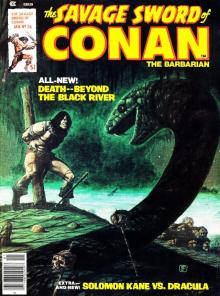 Beyond the Black River
Beyond the Black River Gods of the North
Gods of the North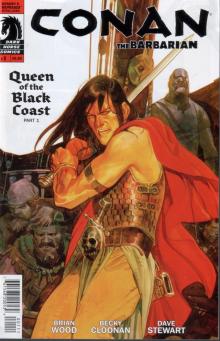 Queen of the Black Coast
Queen of the Black Coast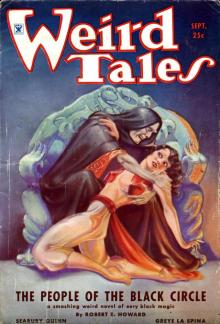 The People of the Black Circle
The People of the Black Circle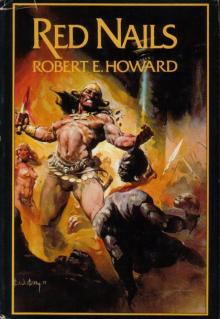 Red Nails
Red Nails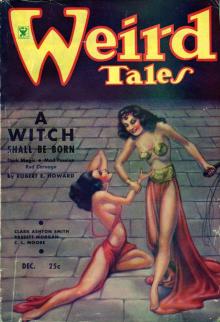 A Witch Shall Be Born
A Witch Shall Be Born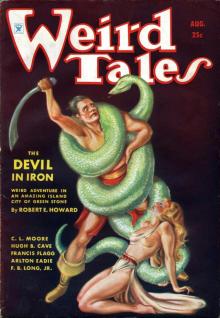 The Devil in Iron
The Devil in Iron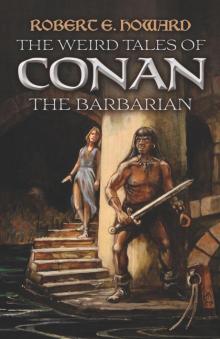 The Weird Tales of Conan the Barbarian
The Weird Tales of Conan the Barbarian The Bloody Crown of Conan
The Bloody Crown of Conan The Horror Stories of Robert E. Howard
The Horror Stories of Robert E. Howard Conan the Conqueror
Conan the Conqueror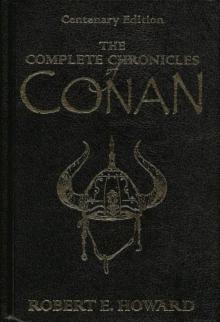 Conan the Barbarian
Conan the Barbarian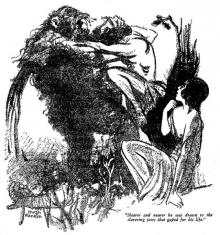 Shadows in the Moonlight
Shadows in the Moonlight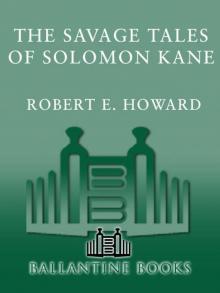 The Savage Tales of Solomon Kane
The Savage Tales of Solomon Kane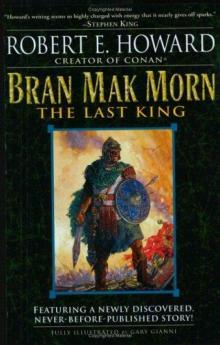 Bran Mak Morn: The Last King
Bran Mak Morn: The Last King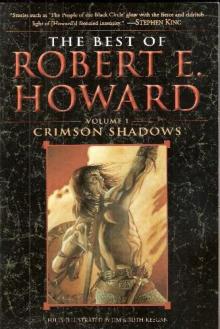 The Best of Robert E. Howard Volume One: Crimson Shadows
The Best of Robert E. Howard Volume One: Crimson Shadows The Best of Robert E. Howard: Crimson Shadows (Volume 1)
The Best of Robert E. Howard: Crimson Shadows (Volume 1) Black Hounds of Death
Black Hounds of Death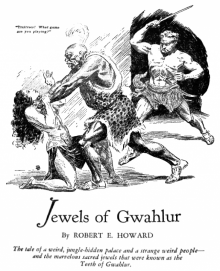 Jewels of Gwahlur
Jewels of Gwahlur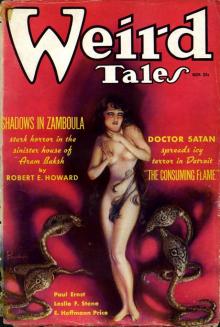 Shadows in Zamboula
Shadows in Zamboula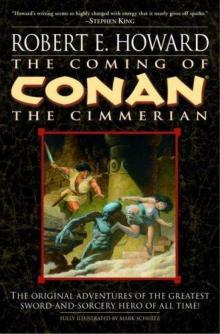 The Coming of Conan the Cimmerian
The Coming of Conan the Cimmerian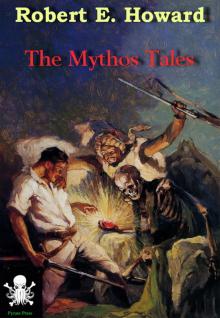 The Mythos Tales
The Mythos Tales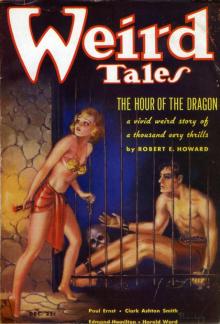 The Hour of the Dragon
The Hour of the Dragon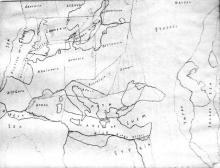 The Hyborian Age
The Hyborian Age El Borak and Other Desert Adventures
El Borak and Other Desert Adventures The Best of Robert E. Howard Volume 1 The Best of Robert E. Howard Volume 1
The Best of Robert E. Howard Volume 1 The Best of Robert E. Howard Volume 1 El Borak: The Complete Tales
El Borak: The Complete Tales Kull: Exile of Atlantis
Kull: Exile of Atlantis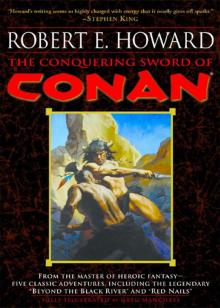 The Conquering Sword of Conan
The Conquering Sword of Conan The Conan Compendium
The Conan Compendium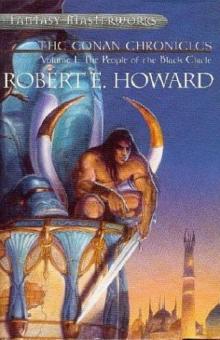 The Conan Chronicles: Volume 1: The People of the Black Circle
The Conan Chronicles: Volume 1: The People of the Black Circle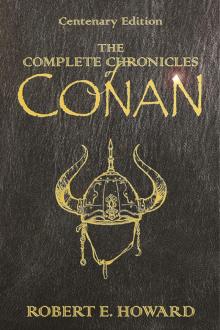 The Complete Chronicles of Conan: Centenary Edition
The Complete Chronicles of Conan: Centenary Edition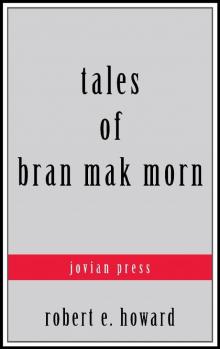 Tales of Bran Mak Morn (Serapis Classics)
Tales of Bran Mak Morn (Serapis Classics)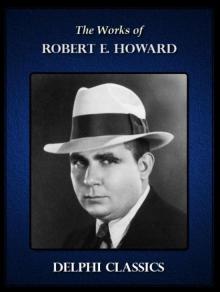 Delphi Works of Robert E. Howard (Illustrated) (Series Four)
Delphi Works of Robert E. Howard (Illustrated) (Series Four) Conan the Barbarian: The Stories That Inspired the Movie
Conan the Barbarian: The Stories That Inspired the Movie People of the Dark Robert Ervin Howard
People of the Dark Robert Ervin Howard Grim Lands
Grim Lands Wings in the Night
Wings in the Night Gardens of Fear
Gardens of Fear A Thunder of Trumpets
A Thunder of Trumpets Detective of the Occult
Detective of the Occult Sword Woman and Other Historical Adventures
Sword Woman and Other Historical Adventures Historical Adventures
Historical Adventures Moon of Skulls
Moon of Skulls The Robert E. Howard Omnibus: 97 Collected Stories
The Robert E. Howard Omnibus: 97 Collected Stories The Pirate Story Megapack: 25 Classic and Modern Tales
The Pirate Story Megapack: 25 Classic and Modern Tales The Best of Robert E. Howard, Volume 2
The Best of Robert E. Howard, Volume 2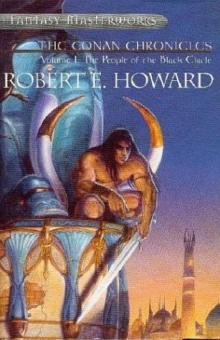 The Conan Chronicles, Vol. 1: The People of the Black Circle
The Conan Chronicles, Vol. 1: The People of the Black Circle Sword Woman and Other Historical Adventures M
Sword Woman and Other Historical Adventures M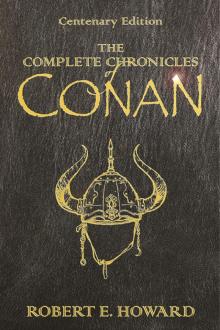 The Complete Chronicles of Conan
The Complete Chronicles of Conan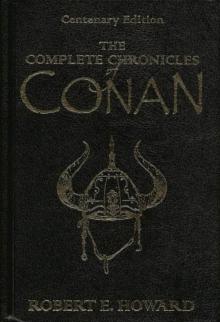 Conan the Barbarian: The Chronicles of Conan (collected short stories)
Conan the Barbarian: The Chronicles of Conan (collected short stories) The Conan the Barbarian Stories
The Conan the Barbarian Stories The Best Horror Stories of
The Best Horror Stories of Tigers Of The Sea cma-4
Tigers Of The Sea cma-4 The Hours of the Dragon
The Hours of the Dragon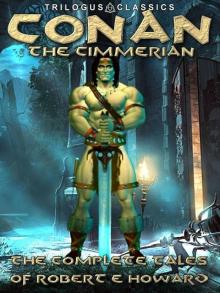 Conan the Cimmerian: The Complete Tales (Trilogus Classics)
Conan the Cimmerian: The Complete Tales (Trilogus Classics) Collected Western Stories of Robert E. Howard (Unexpurgated Edition) (Halcyon Classics)
Collected Western Stories of Robert E. Howard (Unexpurgated Edition) (Halcyon Classics) The Best of Robert E. Howard, Volume 1
The Best of Robert E. Howard, Volume 1 Shadow Kingdoms
Shadow Kingdoms